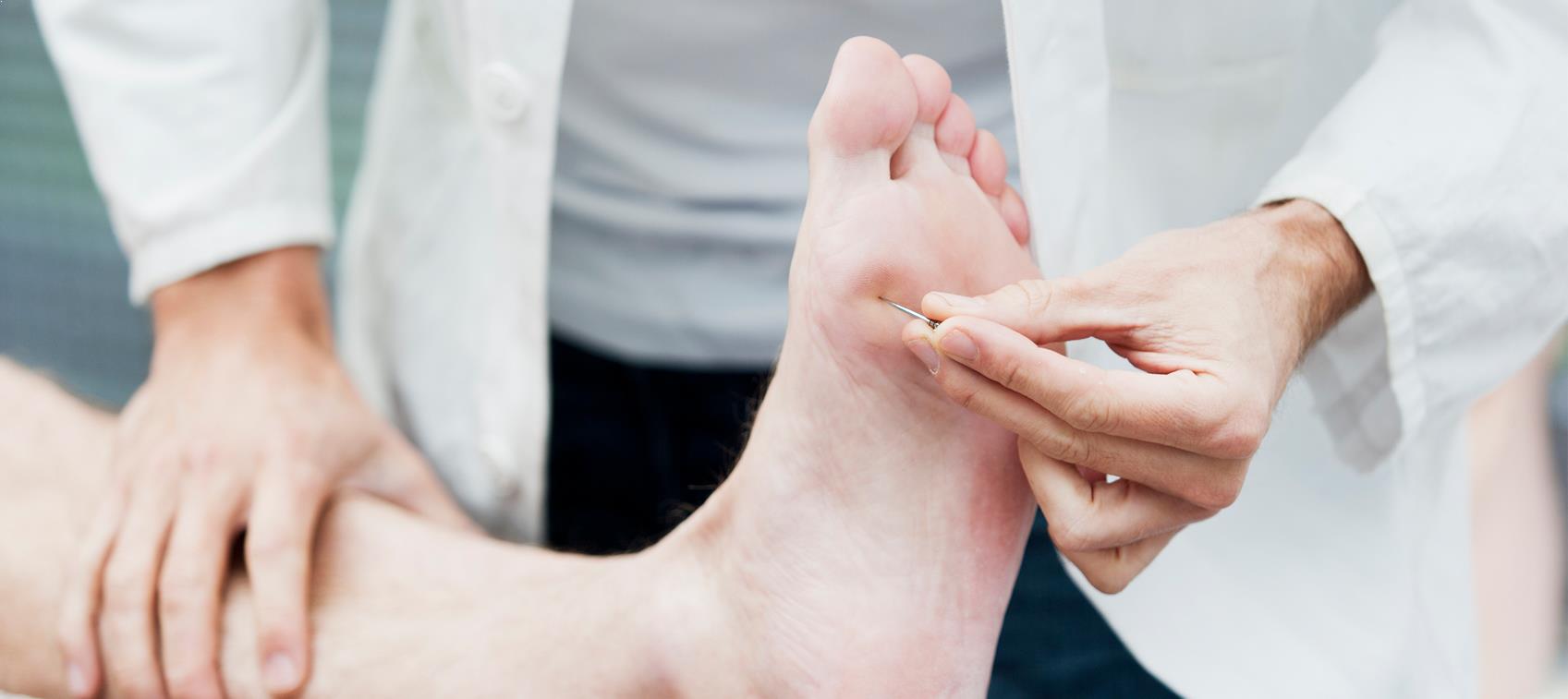
If you’ve ever experienced the excruciating pain of hitting your funny bone, or the numbness and tingling from your foot or arm falling asleep, you have an inkling of what neuropathy feels like. Now imagine dealing with this day in and day out. That’s the norm for the 20 million Americans who suffer with this chronic condition.
Neuropathy is caused by damage to the peripheral nerves, which relay messages between the brain/spinal cord and the rest of the body. It can affect the autonomic nerves, resulting in problems with digestion, bladder control, erections, swallowing, or other involuntary functions. Involvement of the motor nerves may lead to muscle weakness, cramps, and atrophy. Sensory nerve damage, the most common type, distorts nerve impulses that transmit pain, heat, cold and other sensations and causes pain, tingling, numbness, or complete loss of feeling.
More than 100 conditions are linked with neuropathy, including nerve trauma or compression, autoimmune diseases, nutritional deficiencies, heavy metal toxicity, chemotherapy and other drugs, shingles, HIV, Lyme disease, and other infections. Other factors, such as inflammation, glycation, and the accumulation of a type of sugar called sorbitol also damage nerve cells. A third of cases are labeled idiopathic, meaning doctors don’t know the cause. But the most common cause is diabetes.
What Is Diabetic Neuropathy?
Diabetic neuropathy occurs in patients with diabetes because chronically high concentrations of blood sugar injure nerve fibers and the blood vessels that deliver oxygen and nutrients to the peripheral nerves. More than half of patients with diabetes develop some degree of diabetic neuropathy, and it contributes to several complications.
For example, poor sensation in the feet affects balance and coordination. Injuries occur more often if you can’t feel pain, and small nicks, blisters, or pressure sores may go unnoticed. Diabetes-induced circulation problems and impaired wound healing make small blisters, scapes, cuts and other lesions vulnerable to rapid progression into full-blown infected diabetic ulcers, which lead to 73,000 lower limb amputations per year. (Doctors should always try treating diabetic ulcers with sugar dressings—a far superior treatment to conventional wound care. It usually prevents amputations.)
The diminished sensation caused by diabetic neuropathy can lead those with the condition to underestimate the severity of a wound, which can spell disaster.
If you have diabetes, pay particular attention to your feet and any potential problems or changes you witness. These include cuts, scrapes, athlete’s foot, toenail fungus, corns and calluses, blisters, bunions, ingrown toenails, and plantar warts.
How to Treat Diabetic Neuropathy
The first step in treating diabetic neuropathy is to get a handle on your blood sugar with lifestyle changes and supplements like berberine.
Oftentimes prescription painkillers or tricyclic antidepressants such as amitriptyline and nortriptyline and anti-seizure medications like gabapentin (Neurontin) and pregabalin (Lyrica) are prescribed for the nerve pain associated with diabetic neuropathy. I can’t argue against using drugs for intractable pain, but these particular drugs have many side effects and are a stopgap measure at best.
Yet conventional physicians rely on them because they have little else to offer. That’s because they’re following the “clinical guidelines,” which focus on drugs to the exclusion of safe, natural therapies that not only reduce pain but also slow disease progression, promote nerve regeneration, and can actually reverse diabetic neuropathy. Here are some of those treatments:
- Alpha lipoic acid is an extraordinary antioxidant and treatment for diabetic neuropathy. It has been shown in clinical studies to improve pain, burning, numbness and other symptoms of diabetic neuropathy. Dozens of clinical trials demonstrate the benefits of both intravenous and oral alpha lipoic acid. Antioxidants are particularly important because diabetes unleashes a storm of free-radical damage, which plays a key role in the vascular and nerve damage that underlie diabetic complications. Take 600–1,200 mg per day.
- B vitamins. Patients with diabetic neuropathy are often deficient in B-complex vitamins. Be sure to take 1,500 mcg of B12 daily, in addition to 150 mg of B6, which helps prevent diabetes-related damage to the nerves, blood vessels, kidneys and eyes. Also, benfotiamine, a fat-soluble, highly absorbable form of thiamine (vitamin B1), has been shown to reduce diabetic pain, improve nerve conduction velocity, and provide sustained improvement in sensation. Take 300 mg per day.
- Fish oil. For years, people with type 2 diabetes were advised to avoid fish oil because of its presumably negative effects on blood sugar control. However, a recent meta-analysis of prior studies found that fish oil doses ranging from 3,000–18,000 mg per day had no harmful effect on blood glucose control—and significantly improved triglyceride levels. Furthermore, inflammation is a factor with diabetic neuropathy, and fish oil has natural anti-inflammatory properties. Take a minimum of 2 g of high-quality fish oil per day.
- Gamma linolenic acid (GLA) has been shown in studies to prevent the deterioration associated with diabetic neuropathy and, in some cases, even reverse the condition. Borage and evening primrose oils are the best sources of GLA. The dosage for borage oil is 2–3 g; the dosage for evening primrose oil is 4–6 g.
- Acetyl-l-carnitine improves nerve function, stimulates nerve fiber regeneration and relieves pain associated with diabetic neuropathy. Take 500–1,000 mg per day.
A host of additional vitamins and minerals play supporting roles in nerve health, and everyone at risk of or suffering with diabetic neuropathy should take a good daily multivitamin supplement. If fact, those with diabetes need to be particularly vigilant because high blood sugar levels trigger significant nutrient losses, further increasing the risk of nerve damage.
Finally, be patient; nutritional therapies may take a few weeks before you notice results.


